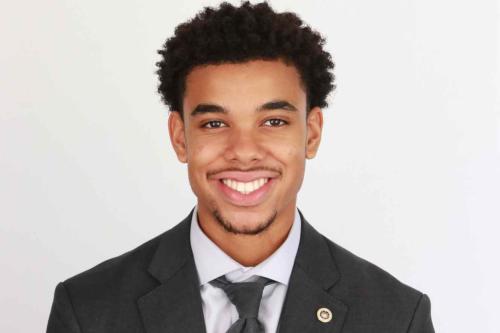In 2014, President Wayne A. I. Frederick aimed to fulfill every Bison’s ability to experience a full, well-rounded undergraduate experience. Talks of a Center of Academic Excellence began, but with Melanie Carter, PhD, on the administrative team, she challenged the task by shifting priorities.
“I proposed to name (the program) after undergraduate studies because that was more aligned with where things were going,” she says.
Prior to Howard, Carter participated in similar initiatives at Ohio State University, where she learned the foundational strategies to build an office that caters to students' needs outside of the classroom. This experience, among examining research of other institutions’ outreach programs, identified best practices for the Office of Undergraduate Studies.
“I also reached out to various universities across the city, really all over, to figure out what kind of structures were in place to support student success,” Carter says. “Most of them have moved to undergraduate techniques, and that’s how we started.”
Carter served as the inaugural associate provost of undergraduate studies and led Howard’s administration to build the office from the ground up. The team consisted of administrators from diverse angles of the university such as advisors, faculty, instructors and members of Dr. Frederick’s cabinet.
“Ultimately, what can we do to make sure the students are successful, they graduate on time, and they have a full and rich experience?” Carter says.
The Office of Undergraduate Studies focused on building an equitable environment for all students to reach their highest potential regardless of their in-class performance. It maintains aspects outside of the classroom with the scholar’s program which equips students with resources to apply for the Rhodes Scholarship, Harry S. Truman Scholarship, and other high-esteem cohorts.
Carter emphasizes the need for strategies that were replicated at other universities and saw massive success to showcase the importance of “institutionalizing success across campus.”
“I was very intentional about adopting strategies that were proven to be effective and were identified as high impact,” Carter say. “We put in a variety of things that were focused on improving the students’ chances of success...because there were some key initiatives that helped us do that.”
In partnership with University advisors, they implemented a campus-wide campaign called “GOT 15?” which encourages students to take 15 hours per semester to accumulate 120 credits and graduate in a four-year span.
Within the curriculum, the Office of Undergraduate Studies championed the creation of a college algebra class that bridged the learning gap between high school education and intro college classes with additional tutoring services.
Among the success of these programs, the Office of Undergraduate Studies received grant funding from Lumina Foundation and participates in the Student Success Project along with Morgan State University, and Dillard University in 2017.
“We worked over the course of three years to implement this across campuses to see what works at HBCUs,” Carter says. “We identified two strategies to embark on: one was adopting a predictive analytics form called navigate which we named Bison Advisor. The second thing we adopted was second-year experience programs because we felt the second year is often overlooked.”
Two additional suboffices have been added to the original undergraduate program: the Academic Center for Excellence and the Center for Career and Professional Success to solidify the goals originally mapped out by Carter and the inaugural cabinet members.
Currently, Associate Provost Kenneth Anderson, PhD, sits at the helm of the Office of Undergraduate Studies and continues to work closely with the seven undergraduate colleges in biweekly meetings.
Many of Carter’s original initiatives remain priority: student retention, enrollment, high graduation rates, and post-grad readiness which has now expanded into a multitude of opportunities; post-grad employment, opening a business or attending grad school.
Anderson is also preparing to establish the Office of General Education under the Office of Undergraduate Studies. Anderson hopes to launch the Office of General Education by Fall 2023 in hopes of creating adapting the plan before 2025.
“We have a council on Graduate Academic Advising Council, where we meet with the other advisors and leadership across well, these are more assistant deans, so non-faculty leadership.” Anderson said. “One thing that we're really proud of now is we have just completed the revision of general education at Howard University.”
A core focus is building a “centralized system” where students can assess multiple facets of the undergraduate experience in one process. One current goal is to ease and reimagine the process double majoring.
“As an example, mathematics is an arts and sciences and computer science is in the College of Engineering and Architecture, that is a natural fit for a double major,” Anderson said. “The general education requirements were so different between the schools and colleges; students will have so many additional credits to take disconnected from the major. Now we have a vehicle to really have these conversations.”
However, the program will still amplify the original goals of the Office of Undergraduate Studies: providing students with exceptional undergraduate opportunities and maintaining an equitable foundation where all Bisons can thrive.
“It’ll be 22 years since we had sort of this wholesale revision. That's not an easy task,” Anderson says. “But we're proud of where we are, and I think this is really a vehicle that will help undergraduate students have flexibility.”





